Key takeaways:
- Empathy is a skill developed through connection, active listening, and shared experiences, beyond mere sympathy.
- Volunteering enhances social awareness, highlighting systemic challenges and personal stories that drive advocacy for equity and inclusion.
- Simple acts of kindness in daily interactions cultivate a deeper sense of community and enrich personal relationships through genuine understanding.
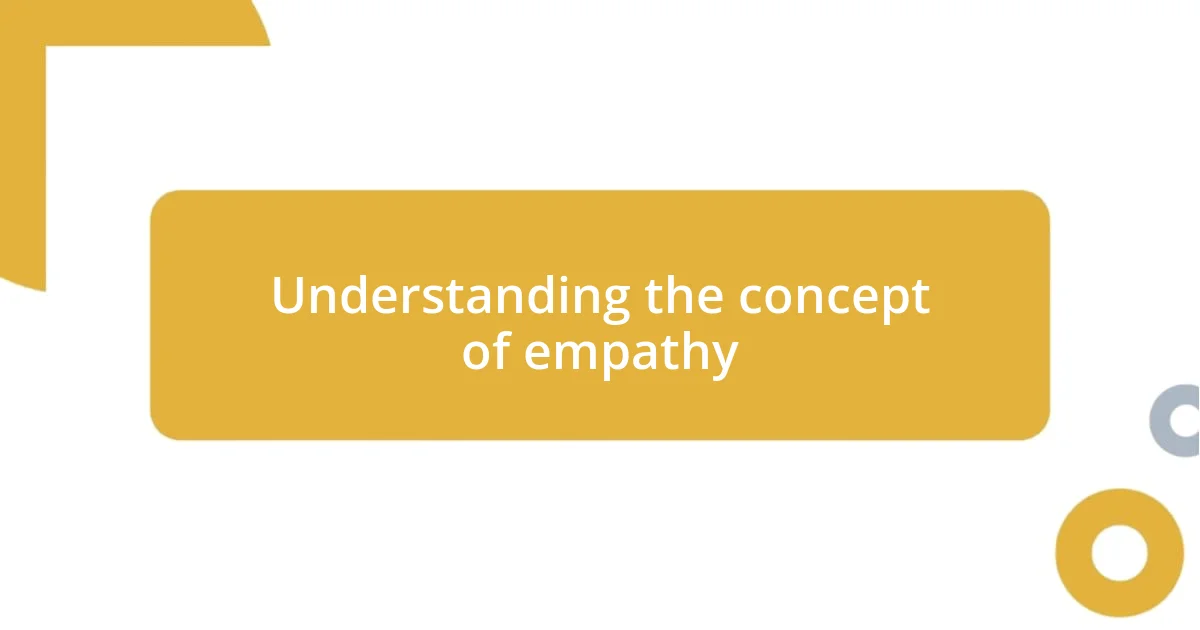
Understanding the concept of empathy
Empathy, at its core, is the ability to connect deeply with others’ feelings and experiences. I remember the first time I volunteered at a homeless shelter. It struck me how easily I could feel the weight of their struggles as I listened to their stories; it was like holding up a mirror to my own life’s challenges. Can we truly understand someone if we haven’t walked a mile in their shoes?
As I formed connections with those I served, I realized that empathy goes beyond sympathy—it’s about shared humanity. One evening, a woman shared her journey of loss, and instead of offering platitudes, I found myself sitting in silence, simply sharing in her pain. In those moments, I discovered that sometimes, being present is the most powerful act of empathy we can offer.
This experience taught me that empathy is also a skill we can nurture. It isn’t just about feeling; it’s about actively engaging with others without judgment. Have you ever paused to consider how your daily interactions might transform if you focused more on understanding rather than reacting? I found that by making this simple shift in perspective, even mundane conversations blossomed into meaningful exchanges.
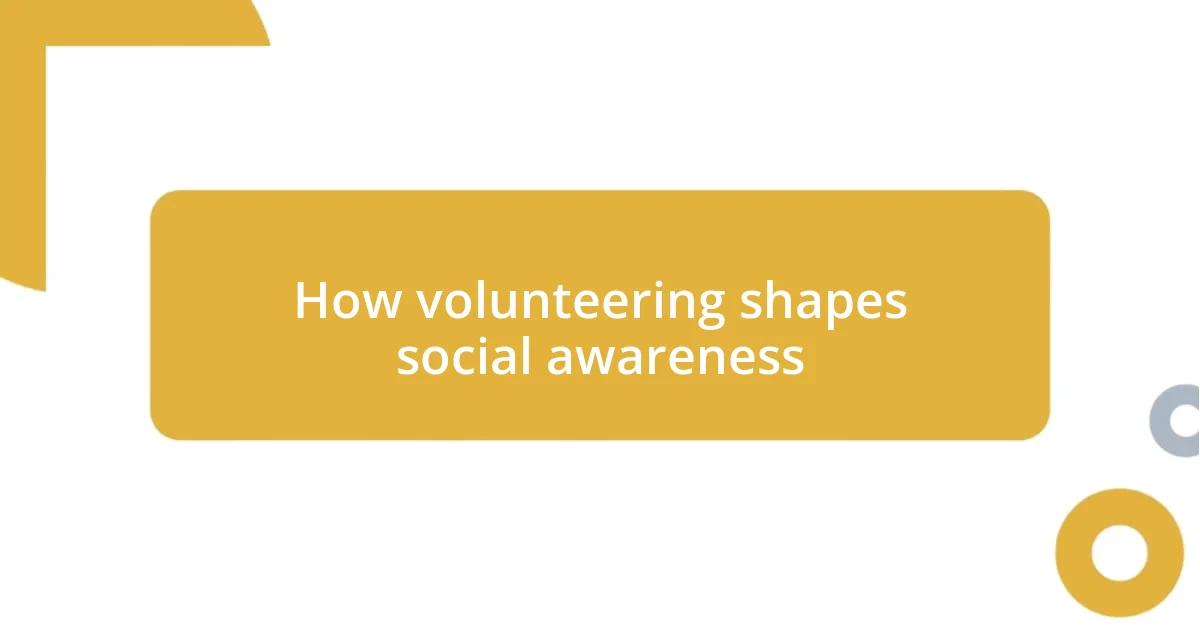
How volunteering shapes social awareness
Volunteering has an incredible way of sharpening our social awareness. When I joined a local food bank, I was amazed at how quickly I began to recognize the nuanced realities of food insecurity. Each face that passed through the line had a unique story, often unfolding layers of hardship I hadn’t considered before. Witnessing these daily struggles awakened a sense of responsibility within me, serving as a reminder that my actions contribute to the larger narrative of my community.
In another instance, while working with at-risk youth, I learned that social awareness isn’t just about noticing the challenges others face; it’s also about understanding the systems that perpetuate those challenges. Engaging with these young individuals made me acutely aware of the disparities in opportunities based on backgrounds. It fueled my desire to advocate for change, prompting me to not only volunteer but also educate others on the importance of equity and inclusion. Have you ever felt that stirring urge to act after learning something new about people around you? I certainly did, as I realized that knowledge without action feels incomplete.
By immersing ourselves in volunteer work, we cultivate a sense of connection to our community while expanding our perspectives. I vividly recall a conversation I had with a refugee during a community art project; her insights into displacement painted a vivid picture that transcended statistics I’d read. Such experiences challenge us to think critically about our roles within society and how we can contribute positively. In this shared space of humanity, I found a collective heartbeat that urged me to be more attuned to the needs around me.
| Volunteering Experience | Lesson Learned |
|---|---|
| Serving at a homeless shelter | Recognizing shared struggles enhances empathy and personal responsibility. |
| Working with at-risk youth | Understanding systemic challenges deepens advocacy for equity. |
| Community art project with refugees | Personal stories can transform abstract issues into heartfelt understandings. |
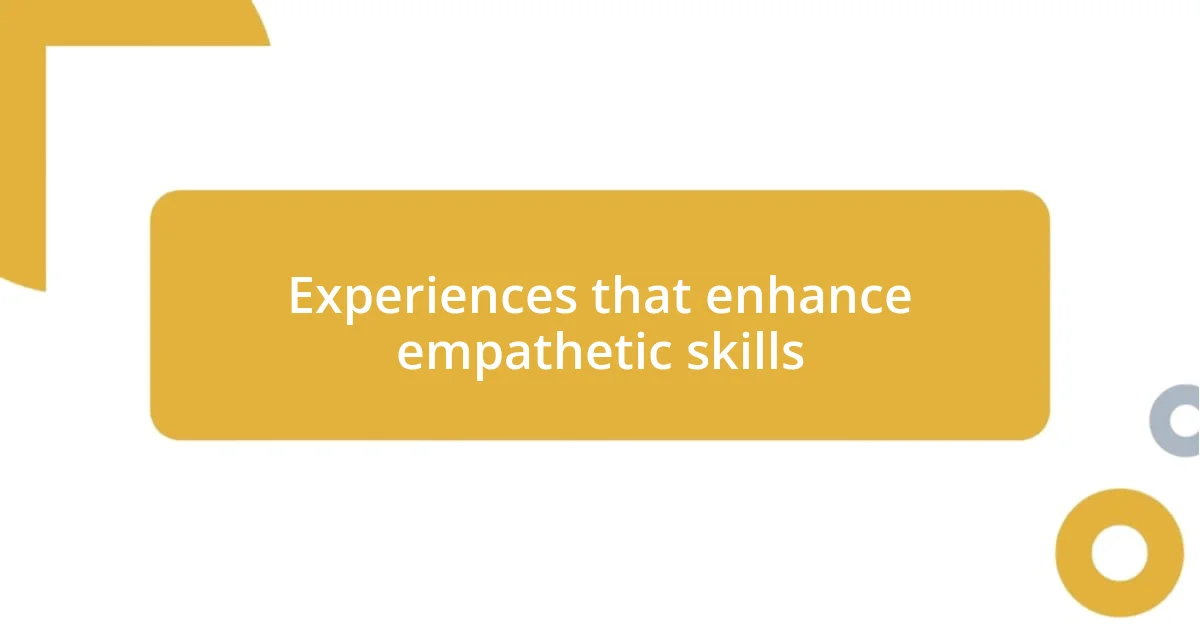
Experiences that enhance empathetic skills
When I think back to my time volunteering at a senior center, the smiles and laughter often disguised deeper heartaches. One woman stood out to me; every week, she’d share stories about her late husband. Listening to her, I felt the weight of her grief and the importance of those memories. It wasn’t just about hearing her words; it was about understanding her emotions, which profoundly deepened my empathy.
Experiences that enhance empathetic skills come from interactions that push us beyond our comfort zone, including:
– Listening actively: Engaging fully when someone shares their story, without thinking about your response.
– Challenging preconceptions: Volunteering with diverse groups, allowing fresh perspectives to challenge your bias.
– Embracing vulnerability: Sharing your own experiences creates a bond; I recall opening up about my struggles, and her tears turned into connection.
– Fostering patience: Sometimes, it just takes time to connect. I learned to appreciate silence as a space for healing rather than filling it with words.
– Sharing moments of joy: In the midst of serving, celebrating small wins together can elevate our understanding of each other’s lives.
These moments reminded me that empathy isn’t just a feeling; it’s a practice, one that’s built through genuine experiences and heartfelt connections.
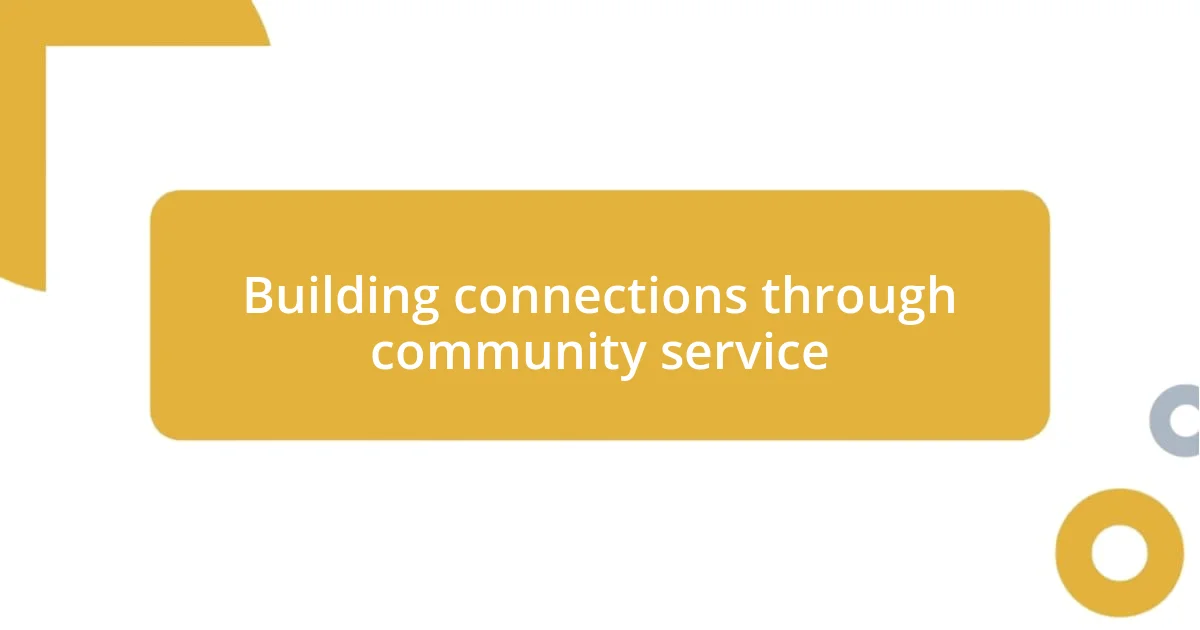
Building connections through community service
Building connections through community service naturally fosters relationships that transcend mere interactions. I remember when I volunteered at a community garden, where we all came together to plant seeds and share stories while getting our hands dirty. It struck me how these simple acts created a bond; every person I met had a unique life story, yet here we were, united by the earth beneath us and a common goal. Isn’t it fascinating how working side by side can create a sense of understanding that words alone often fail to convey?
In another instance, while helping to renovate a local shelter, I connected deeply with a fellow volunteer who had faced homelessness in her past. As we painted walls together, she shared her journey of resilience and hope. I couldn’t help but feel admiration for her strength, and I realized that our shared effort turned into a tapestry of collaboration—every brushstroke symbolizing empathy. It reminded me that we all carry invisible burdens and that lifting each other up can spark connections that redefine our perceptions of one another.
These experiences weren’t just about the tasks at hand; they were pivotal moments harnessing the essence of community. I found myself reflecting on how service could be a bridge, creating relationships that might never have formed otherwise. Have you ever felt that sensation of belonging with someone after simply sharing a moment of vulnerability? That’s the true power of community service—it invites us to step outside our bubbles and weave a richer narrative of connection, empathy, and understanding.
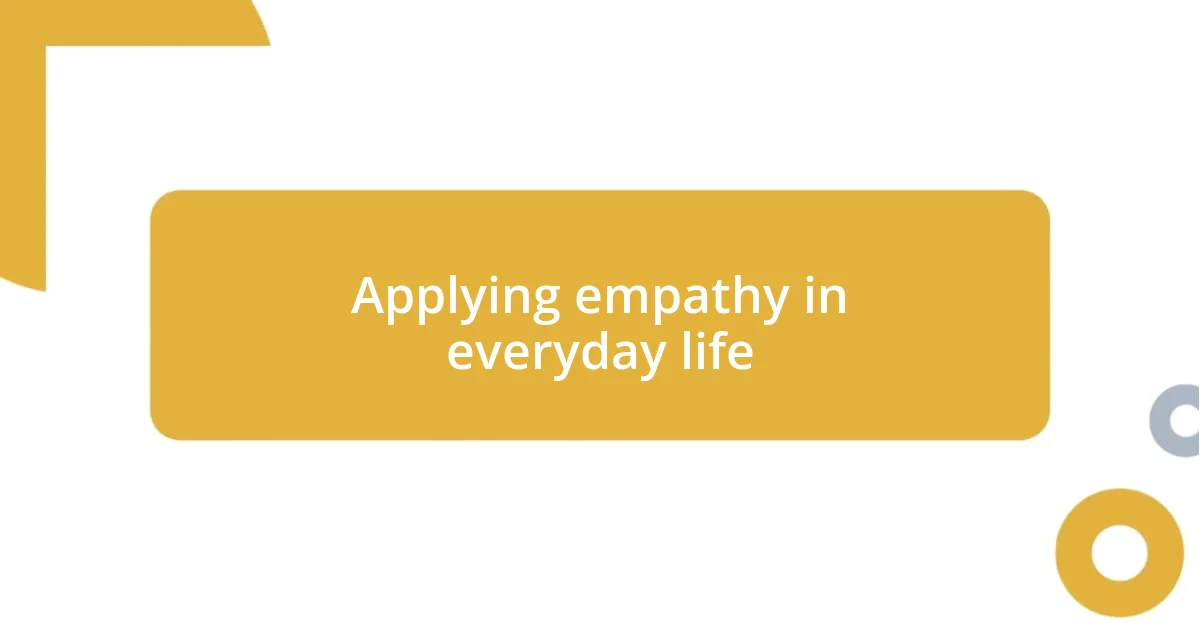
Applying empathy in everyday life
Empathy seeps into our daily routines in the smallest interactions. I recall a rainy afternoon when I offered my umbrella to a stranger caught in a sudden downpour. The gratitude in her eyes reminded me that a simple act of kindness can transform someone’s day. Have you ever noticed how a genuine smile or a kind word can change the atmosphere around you? It’s these little moments that remind us of our shared humanity.
In conversations, I try to refrain from jumping in with my own experiences too quickly. Instead, I focus on really understanding the other person’s feelings—a habit I developed during my volunteering days. I once spoke with a young man whose family was going through a tough time. When I sincerely asked how he was coping, he opened up about his struggles. The vulnerability he showed offered me insights into his world, and at that moment, I realized how sharing burdens can lighten the load for both parties.
I’ve found that practicing empathy in everyday life doesn’t just fill my heart; it enriches my interactions. Whether it’s checking in on a friend who seems down or offering help to a colleague facing challenges, I aim to create an environment where empathy flourishes. Isn’t it incredible how, when we lead with empathy, we not only uplift others but also cultivate our own happiness? This cycle of giving and receiving is what makes our relationships deeper and more meaningful.












